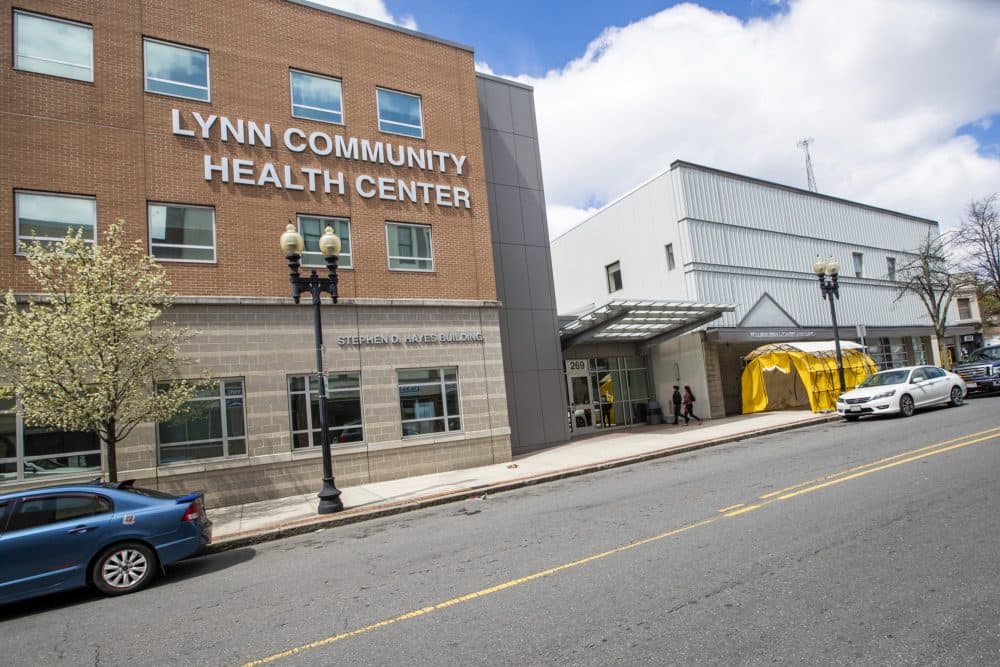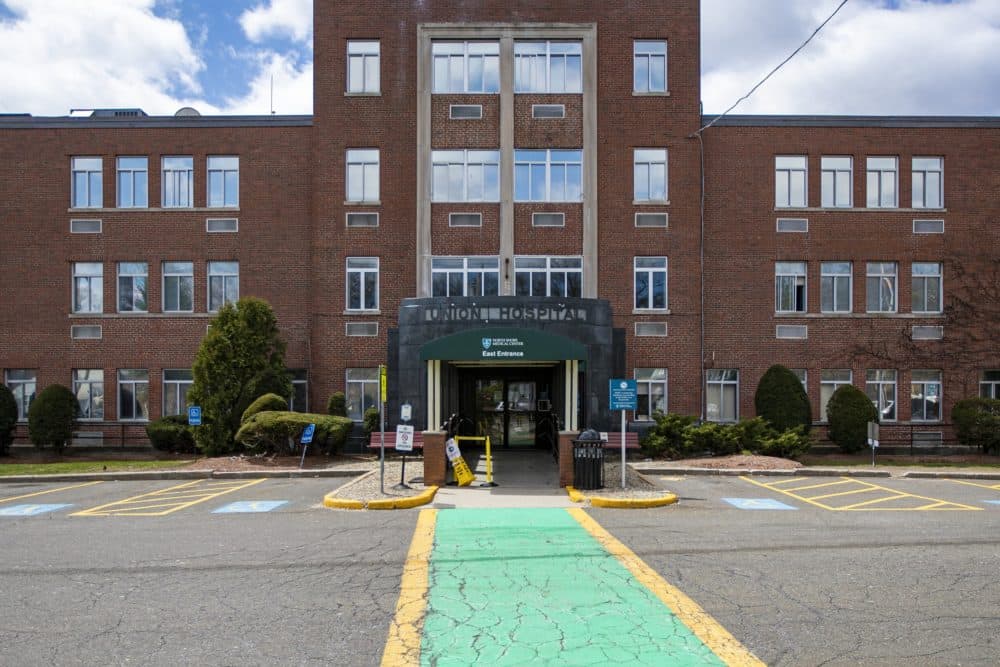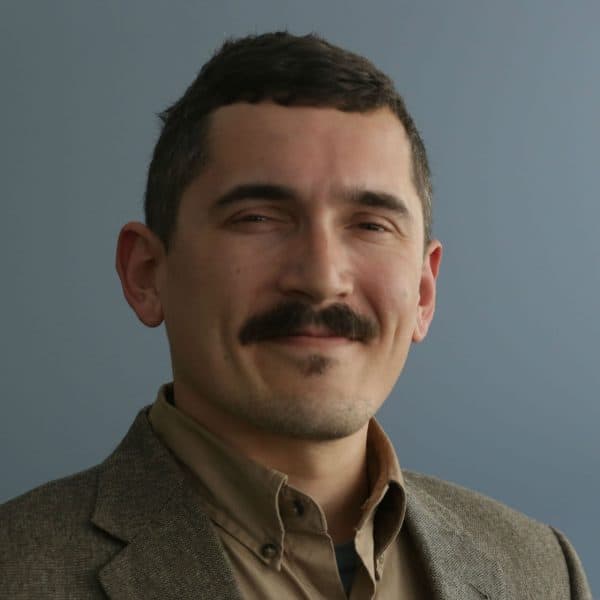Advertisement
As COVID Cases Soar, Some Lynn Residents Fear Hospitalizations, Feel Consequences Of Losing City's Only Hospital
ResumeEn español, traducido por El Planeta Media.
In November, the city of Lynn lost its only hospital — an event advocates describe as a coup de grâce in a decades-long series of health care blows to the city.
When Lynn's Union Hospital closed, it became a part of North Shore Medical Center network. The facility still offers outpatient services, but what people typically associate with hospital care — such as overnight stays, emergency room access and the ability to perform surgeries — are all unavailable.
Now Lynn has the fifth highest number of COVID-19 cases in the state, and some sick people in the city fear there is nowhere to turn.
'We Kept Calling The Clinic'
Lesli Escalante lives with her husband and two sons in Lynn. Her husband is a plasterer, and they think he contracted the coronavirus on the job. Everyone in the house ended up getting sick — but the worst case was Lesli — who’s 52 and suffers from diabetes and high blood pressure.

She describes the sickness as a terrible pain moving around her body — in her back, then in her bones and in her head — fever, chills, exhaustion, diarrhea.
Because of Union Hospital's closure, Escalante called Lynn Community Health Center to try and get a coronavirus test. She says she was turned away, told she wouldn’t be seen even if she showed up in person, and to call 911 if she got worse.
That would mean going to a hospital, she says, and that's where people go to die.
"What could we do?" Escalante says in Spanish.
"If the four of us had died in our apartment, no one would have known ... even though we kept calling the clinic," she adds.
Escalante says she felt abandoned — not just by the federal or state government, but by a city that she hasn't heard from since the outbreak began more than a month ago, and by the community health center that wouldn’t see her.
"If the four of us had died in our apartment, no one would have known...even though we kept calling the clinic."
Lesli Escalante, Lynn resident
In hindsight, officials at Lynn Community Health Center say Escalante should likely have been seen given how sick she was, as well as her age and underlying conditions.
"Our chief mission is to take care of people. This is somebody that we'd want to see," said Chief Medical Officer Dr. Geoffrey Pechinsky. He says Escalante should feel welcome at the clinic, but whoever decided to tell her not to come had to think quickly amid the crisis, and the decision wasn't necessarily wrong.
"[We have to consider] how this person sounded on the phone, what they say their symptoms are, what they say their past medical history is," he says.
Staff decide whether a patient should come in and risk being exposed, he says, or whether it's safe for them to quarantine at home.
"And I think that’s a really tough decision to have to make on the phone," Pechinsky said.
Nearly two weeks after she first called, Escalante says she was finally able to get the COVID-19 test on Wednesday. But she says she needs to see a doctor, and she's still waiting for an appointment.
Union Hospital Closes
Densely-populated working-class neighborhoods are emerging as hotspots in the COVID-19 outbreak — places like the Bronx, New York, and places like Lynn, Massachusetts. The city of 95,000 is just 10 miles north of Boston.

"We're being overwhelmed with these serious cases of COVID-19," said Lynn Mayor Thomas McGee, adding the city is being hit harder than the numbers indicate. "The reality is that we're not getting the testing we need, period. ... The testing, the contact tracing, the kind of things that we need to do to get this under control have been unavailable."
Partners HealthCare lists Lynn among a small group of hotspots that include a few Boston neighborhoods, as well as Everett, Revere and Chelsea. The latter of which has the highest rate of cases in the state. Lynn has less than half the rate of Chelsea, but the number of cases jumped nearly 90% last week.
"It's the poorest city on the North Shore," said attorney Laura Gallant, a board member of Lynn's community health center and an opponent of the decision to close Union Hospital. "It is the most diverse city on the North Shore. It has the lowest incomes."
On the North Shore, she says, Lynn should be the last place to shutter a hospital.
"The overall quality of the housing is lower. It's more crowded. There's more immigrants. There's more non-English speakers. Educational attainment is lower. Income is lower. In a more rational system we’d say, ’This is where we need to site healthcare resources and facilities,' " she says.
Partners decided to close Lynn Union Hospital last November. The two hospitals in Lynn and Salem were losing money, and Partners decided it made sense to consolidate resources in one facility rather than offer inferior services in both.
Dr. David Roberts runs the Salem hospital, North Shore Medical Center, and he's standing behind the decision to close Lynn's hospital services — particularly in light of the COVID-19 outbreak.
"I can't tell you the number of doctors that have come up to me in the last few weeks and said, 'Aren't you glad we closed Union? Can you imagine trying to deliver this kind of care in two hospitals, two ICUs, two emergency rooms? We would have been stretched incredibly thin,' " Roberts says.
"I think we're much better positioned to handle a pandemic — in a consolidated single facility, fully-staffed with every specialty known to mankind — than we would have been in two struggling hospitals," he adds.
The Way Forward
With nearly 40% of COVID patients coming from Lynn, Roberts says the the North Shore Medical Center in Salem has enough beds and staff to handle the outbreak, and the emergency room is operating under capacity. But in mid-March, his team scrambled to open a testing site outside the old hospital in Lynn.
Dr. Adrienne Allen helped open an emergency respiratory clinic on the site earlier this month. Now she says the problem isn’t the lack of testing, but how to get the word out that testing is available.
"If you're in the community, you have a sore throat, runny nose, a cough, even mild symptoms," Allen says. "It's OK to get tested because we need to understand what that is. Great things we would normally ignore while they're covered going around. And if you live in Lynn, you can get tested."
Partners has ramped up screening in Lynn to the point where they can test 200 people a day. But after weeks of telling residents there wasn't enough testing, getting people to the testing site isn’t easy.
"If you're in the community, you have a sore throat, runny nose, a cough, even mild symptoms, it's OK to get tested because we need to understand what that is. Great things we would normally ignore while they're covered going around. And if you live in Lynn, you can get tested."
Dr. Adrienne Allen
One Lynn resident with no plans to get tested is Juana Gomez. She believes she has COVID-19 after coming in contact with her brother, who tested positive and who is still at North Shore Medical Center in Salem. Gomez says she’s planning to isolate herself at home and doesn’t think she needs to see a doctor.
"I’m afraid of going to the hospital," she says in Spanish.
As a Hispanic, Gomez says she never felt she got the same priority in health care settings as white people. With a pandemic underway, she can't imagine how that will change.
"I'm scared of getting more sick," she says.
But North Shore Medical Center President Dr. David Roberts says people like Gomez need to be careful when deciding to ride out the sickness without any help.
"Someone like her should probably go the respiratory clinic [in Lynn], get examined, get her lungs listened to, potentially get a chest X-ray," he explains. "What we are finding is, people wait, wait, wait, 'I don't want to go to the hospital. I don't feel that badly.' And then all of a sudden: 'I can't breathe.' And they call the ambulance."
Now Juana Gomez says one of her biggest concerns is to keep the virus from spreading to the 14 other people who live in her building. So far, she’s the only one who’s gotten sick.
This segment aired on April 27, 2020.

